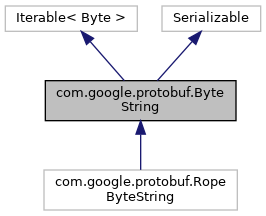
Classes | |
| class | AbstractByteIterator |
| class | ArraysByteArrayCopier |
| interface | ByteArrayCopier |
| interface | ByteIterator |
| class | SystemByteArrayCopier |
Public Member Functions | |
| abstract byte | byteAt (int index) |
| final boolean | isEmpty () |
| ByteIterator | iterator () |
| abstract int | size () |
Static Public Attributes | |
| static final ByteString | EMPTY = new LiteralByteString(Internal.EMPTY_BYTE_ARRAY) |
Static Private Member Functions | |
| static int | toInt (byte value) |
Private Attributes | |
| int | hash = 0 |
Static Private Attributes | |
| static final ByteArrayCopier | byteArrayCopier |
| static final int | UNSIGNED_BYTE_MASK = 0xFF |
| static final Comparator< ByteString > | UNSIGNED_LEXICOGRAPHICAL_COMPARATOR |
Detailed Description
Immutable sequence of bytes. Substring is supported by sharing the reference to the immutable underlying bytes. Concatenation is likewise supported without copying (long strings) by building a tree of pieces in RopeByteString.
Like String, the contents of a ByteString can never be observed to change, not even in the presence of a data race or incorrect API usage in the client code.
Definition at line 67 of file ByteString.java.
Member Function Documentation
◆ byteAt()
|
abstract |
Gets the byte at the given index. This method should be used only for random access to individual bytes. To access bytes sequentially, use the ByteIterator returned by {}, and call #substring(int, int)} first if necessary. index index of byte the value IndexOutOfBoundsException index < 0 or index >= size
◆ isEmpty()
|
inline |
Returns
if the size is
,
otherwise.
- Returns
- true if this is zero bytes long
Definition at line 225 of file ByteString.java.
◆ iterator()
|
inline |
Return a ByteString.ByteIterator over the bytes in the ByteString. To avoid auto-boxing, you may get the iterator manually and call ByteIterator#nextByte().
- Returns
- the iterator
Definition at line 165 of file ByteString.java.
◆ size()
|
abstract |
Gets the number of bytes.
- Returns
- size in bytes
◆ toInt()
|
inlinestaticprivate |
Returns the value of the given byte as an integer, interpreting the byte as an unsigned value. That is, returns
if
is negative;
itself otherwise.
Note: This code was copied from com.google.common.primitives.UnsignedBytes#toInt, as Guava libraries cannot be used in the
package.
Definition at line 242 of file ByteString.java.
Member Data Documentation
◆ byteArrayCopier
|
staticprivate |
Definition at line 121 of file ByteString.java.
◆ EMPTY
|
static |
◆ hash
|
private |
Cached hash value. Intentionally accessed via a data race, which is safe because of the Java Memory Model's "no out-of-thin-air values" guarantees for ints. A value of 0 implies that the hash has not been set.
Definition at line 133 of file ByteString.java.
◆ UNSIGNED_BYTE_MASK
|
staticprivate |
Definition at line 232 of file ByteString.java.
◆ UNSIGNED_LEXICOGRAPHICAL_COMPARATOR
|
staticprivate |
Compares two ByteStrings lexicographically, treating their contents as unsigned byte values between 0 and 255 (inclusive).
For example,
is considered to be greater than
because it is interpreted as an unsigned value,
.
Definition at line 253 of file ByteString.java.
The documentation for this class was generated from the following file: